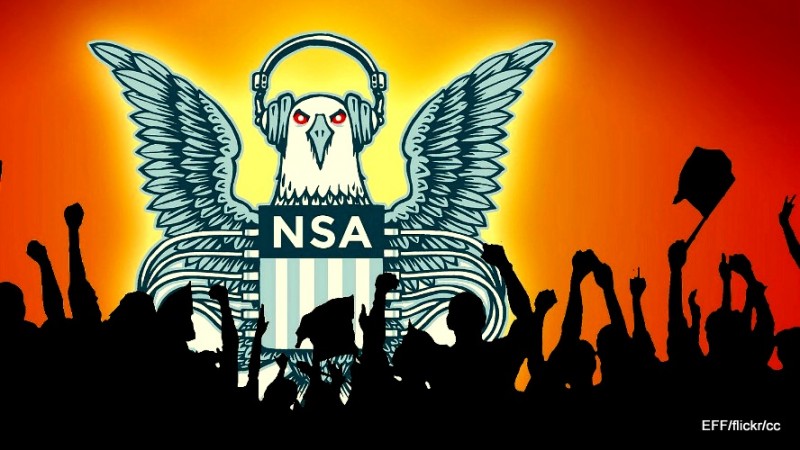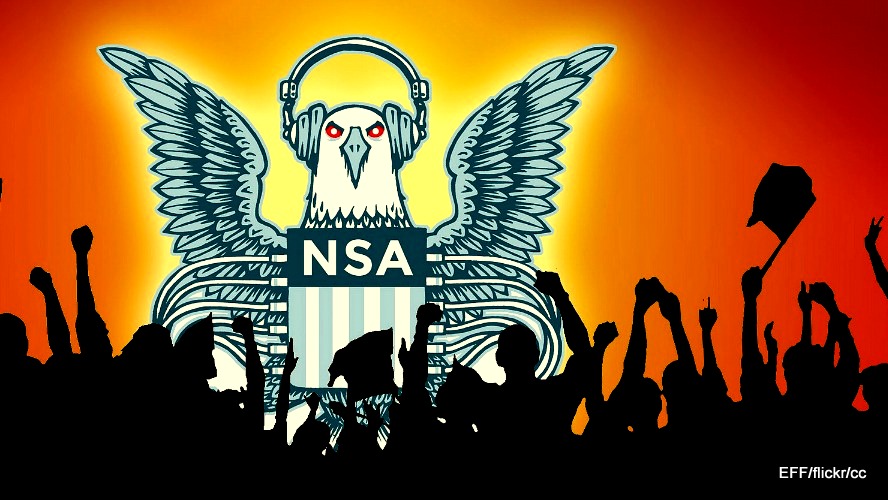
Report by Lee Fang for The Intercept— The debate over the NSA’s bulk collection of phone records has reached a critical point after a federal appeals court last week ruled the practice illegal, dramatically raising the stakes for pending Congressional legislation that would fully or partially reinstate the program. An army of pundits promptly took to television screens, with many of them brushing off concerns about the surveillance.
The talking heads have been backstopping the NSA’s mass surveillance more or less continuously since it was revealed. They spoke out to support the agency when NSA contractor Edward Snowden released details of its programs in 2013, and they’ve kept up their advocacy ever since — on television news shows, newspaper op-ed pages, online and at Congressional hearings. But it’s often unclear just how financially cozy these pundits are with the surveillance state they defend, since they’re typically identified with titles that give no clues about their conflicts of interest. Such conflicts have become particularly important, and worth pointing out, now that the debate about NSA surveillance has shifted from simple outrage to politically prominent legislative debates.
As one example of the opaque link between NSA money and punditry, take the words of Stewart Baker, who was general counsel to the NSA from 1992 through 1994. During a Senate committee hearing last summer on one of the reform bills now before Congress, the USA FREEDOM Act, which would partially limit mass surveillance of telephone metadata, Baker essentially said the bill would aid terrorists.
“First, I do not believe we should end the bulk collection program,” he told the Senate Select Committee on Intelligence. “It will put us at risk. It will, as Senator King strongly suggested, slow our responses to serious terrorist incidents. And it is a leap into the dark with respect to this data.”
Previously, in December 2013, Baker wrote in The New York Times that “Snowden has already lost the broader debate he claims to want, and the leaks are slowly losing their international impact as well.” He made similar comments in multiple news outlets, and testified before Congress to defend virtually every program revealed by the Snowden documents. Baker at one point told intelligence committee lawmakers that The Intercept’s Glenn Greenwald was simply on a campaign to “cause the greatest possible diplomatic damage to the United States and its intelligence capabilities.”
Baker has identified himself at various points as a former government official with the NSA and Department of Homeland Security and as a Washington, D.C. attorney. But the law firm at which Baker is a partner, Steptoe & Johnson, maintains a distinct role in the world of NSA contracting. At the time of his pro-NSA advocacy in 2013 and 2014, the company was registered to lobby on behalf of companies which have served as major NSA contractors, including Science Applications International Corporation (SAIC), Leidos and Computer Sciences Corporation (CSC).
Asked about his law firm’s lobby work for NSA contractors, Baker responded, “If you’re looking for someone with a ‘financial stake in the surveillance debate’ you should start with your boss, Glenn Greenwald, who has a $250 million stake in continuing to present the debate as ‘Snowden good. NSA evil.’ And, of course, there’s you. You’ve got a ‘financial stake’ in keeping your job. Which means that you won’t have the balls to publish my reply.” (Pierre Omidyar made a $50 million contribution and $250 million commitment to First Look Media. Glenn Greenwald is the co-founding editor of the First Look publication The Intercept, not the holder of a $250 million stake.)
Due to the secretive nature of the agency’s work, NSA contracts are often shielded from public disclosure, and identifying financial links between pundits and the agency’s web of partners is tricky. But the work of journalists and whistleblowers such as James Bamford, who was assigned to an NSA unit while serving in the Navy, gives us a sense of which companies work for U.S. intelligence agencies. Drawing largely from these disclosures, The Intercept has identified several former government and military officials whose voices have shaped the public discourse around government spying and surveillance issues but whose financial ties to NSA contractors have received little attention. These pundits have played a key role in the public debate as the White House and the agency itself have struggled to defend the most controversial spying programs revealed by Snowden’s documents.


